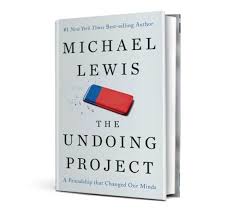Latest posts
A masterclass in creating value
What’s going on at parkrun?
Virtue-signalling all the way to the bank
Bud Light: brand purpose or virtue-signalling?
The Coddling of the American Mind, by Greg Lukianoff and Jonathan Haidt
Belonging, by Owen Eastwood
Such a simple thing
The Long Win, and The Scout Mindset
The Cult of We by Eliot Brown and Maureen Farrell
Coffee and covid modelling
By theme
Marketing strategy
Insight & metrics
Innovation & inspiration
Brand & positioning
Marketing communications
Business purpose
Leadership
By industry sector
Financial services
Retail
FMCG
Technology & start-ups
Consumer services
Business to business
Other sectors
By type
Books
Comment
Quotes
Thought leadership
Here is a brilliant story-teller reporting on two exceptional people doing breakthrough work: their lives, their work, their friendship. It’s an accessible and enjoyable grounding if you’re new to behavioural economics, and it’s unmissable for anyone who’s already into BE and wants to understand where it came from. BE got big for marketers around ten years ago with Nudge, embraced by US and UK governments to change behaviour in areas like income tax, pension planning, and energy consumption. But the discipline emerged from the unlikely collaboration of two very different personalities, Amos Tversky and Daniel Kahneman, starting in the late 1960s. Michael Lewis traces their life stories – eccentric, brash Tversky the Sabra (a native Israeli) who did his military service and more; Kahneman a reserved Jewish boy whose family fled the Nazis in occupied France, with tragic consequences. Striking as these stories are, Lewis also shows how the personalities, and the work, were shaped by experiences most of us can barely imagine. (One has to hope smart thinking isn’t the preserve of those with traumatic early lives.)
Kahenman’s book “Thinking Fast and Slow” is so packed with concepts it can make behavioural economics seem complicated. This book brings it back to first principles. “Undoing” refers to the challenge of making explicit and then removing assumptions about how people think and decide, assumptions which even the academics never questioned, because they went without saying. So many of Kahneman and Tversky’s concepts – heuristics, confirmation bias, loss aversion, the peak-end effect – are now familiar in marketing circles that they start to seem obvious, but Lewis shows how hard these things were to see when started without hindsight. This is a brilliant piece of research and writing, and a bonus for anyone who wants to problem-solve for themselves. We see how new concepts couldn’t be expressed until the old assumptions were revealed and set aside. Even so, the two friends sometimes stumbled into their realisations, finding a neat hypothesis and then having to dump it when it didn’t quite work, and pushing on to find something better.
The context of their lives, early Israel and its wars, the depth and tensions in their intense working relationship, are all honestly revealed. The only gap is that although we hear directly from Danny, we cannot hear from Amos, who died of a brain tumour aged 59. His quick sharp wit is clear though. He once said to an eminent physicist, “You know, Murray, no one is as smart as you think you are. In the early days, after Amos had given a talk, an unnamed English mathematician approached him and said, “I don’t usually like Jews but I like you.” Amos replied, “I usually liked Englishmen but I don’t like you.”
Latest posts
A masterclass in creating value
What’s going on at parkrun?
Virtue-signalling all the way to the bank
Bud Light: brand purpose or virtue-signalling?
The Coddling of the American Mind, by Greg Lukianoff and Jonathan Haidt
Belonging, by Owen Eastwood
Such a simple thing
The Long Win, and The Scout Mindset
The Cult of We by Eliot Brown and Maureen Farrell
Coffee and covid modelling
By theme
Marketing strategy
Insight & metrics
Innovation & inspiration
Brand & positioning
Marketing communications
Business purpose
Leadership
By industry sector
Financial services
Retail
FMCG
Technology & start-ups
Consumer services
Business to business
Other sectors
By type
Books
Comment
Quotes
Thought leadership
